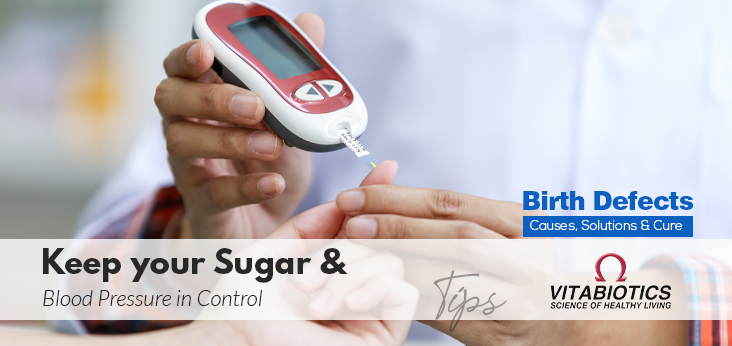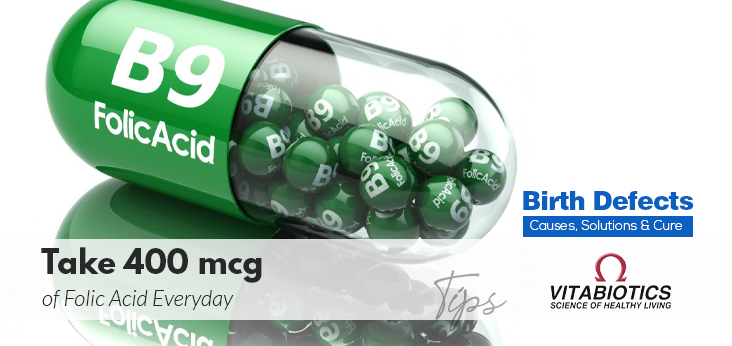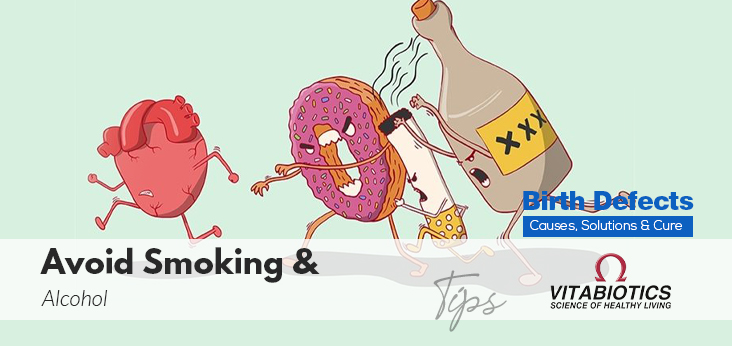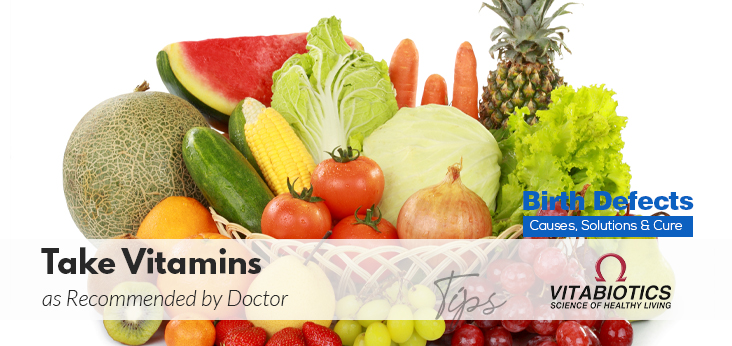Birth defects are structural changes present at birth that can affect almost any part or parts of the body (e.g., heart, brain, foot). They may affect how the body looks, works, or both. Birth defects can vary from mild to severe. The well-being of each child affected with a birth defect depends mostly on which organ or body part is involved and how much it is affected. Depending on the severity of the defect and the affected body part. The expected lifespan of a person with a birth defect may or may not be affected.
What are Neural Tube defects?
Neural Tube defects are severe birth defects of the brain and spine. NTDs occur when the neural tube does not close properly. The neural tube forms the early brain and spine. These types of birth defects develop very early during pregnancy, often before a woman knows she is pregnant.
The two most common NTDs are spina bifida (a spinal cord defect) and anencephaly (a brain defect).
Birth defects can occur during any stage of pregnancy. Most birth defects occur in the first 3 months of pregnancy when the organs of the baby are forming. This is a very important stage of development. However, some birth defects occur later in pregnancy. During the last six months of pregnancy, the tissues and organs continue to grow and develop.
Diagnosis of Birth Defects
Birth defects can be diagnosed during pregnancy or after the baby is born, depending on the specific type of birth defect. The following methods can be used to diagnose birth defects

Screening Tests
A screening test is a procedure or test that is done to see if a woman or her baby might have certain problems. A screening test does not provide a specific diagnosis—that requires a diagnostic test. A screening test can sometimes give an abnormal result even when there is nothing wrong with the mother or her baby. Less often, a screening test result can be normal and miss a problem that does exist. During pregnancy, women are usually offered these screening tests to check for birth defects or other problems for the woman or her baby. Talk to your doctor about any concerns you have about prenatal testing.
1. First Trimester Screening
First-trimester screening is a combination of tests completed between weeks 11 and 13 of pregnancy. It is used to look for certain birth defects related to the baby’s heart or chromosomal disorders, such as Down syndrome. This screen includes a maternal blood test and an ultrasound.
• Maternal Blood Screen
The maternal blood screen is a simple blood test. It measures the levels of two proteins, human chorionic gonadotropin (HCG) and pregnancy-associated plasma protein-A (PAPP-A). If the protein levels are abnormally high or low, there could be a chromosomal disorder in the baby.
• Ultrasound
An ultrasound creates pictures of the baby. The ultrasound for the first-trimester screen looks for extra fluid behind the baby’s neck. If there is an increased fluid found on the ultrasound, there could be a chromosomal disorder or heart defect in the baby.

2. Second Trimester Screening
Second-trimester screening tests are completed between weeks 15 and 20 of pregnancy. They are used to look for certain birth defects in the baby. Second-trimester screening tests include a maternal serum screen and a comprehensive ultrasound evaluation of the baby looking for the presence of structural anomalies (also known as an anomaly ultrasound).
• Maternal Serum Screen
The maternal serum screen is a simple blood test used to identify if a woman is at increased risk for having a baby with certain birth defects, such as neural tube defects or chromosomal disorders such as Down syndrome.
• Fetal Echocardiogram
A fetal echocardiogram is a test that uses sound waves to evaluate the baby’s heart for heart defects before birth. This test can provide a more detailed image of the baby’s heart than a regular pregnancy ultrasound. Some heart defects cannot be seen before birth, even with a fetal echocardiogram. If your healthcare provider finds a problem in the structure of the baby’s heart, a detailed ultrasound may be done to look for other problems with the developing baby.
• Anomaly Ultrasound
An ultrasound creates pictures of the baby. This test is usually completed around 18–20 weeks of pregnancy. The ultrasound is used to check the size of the baby and looks for birth defects or other problems with the baby.
3. Diagnostic Tests
If the result of a screening test is abnormal, doctors usually offer further diagnostic tests to determine if birth defects or other possible problems with the baby are present. These diagnostic tests are also offered to women with higher risk pregnancies, which may include women who are 35 years of age or older; women who have had a previous pregnancy affected by a birth defect; women who have chronic diseases such as lupus, high blood pressure, diabetes, or epilepsy; or women who use certain medications.

High-resolution Ultrasound
An ultrasound creates pictures of the baby. This ultrasound, also known as a level II ultrasound, is used to look in more detail for possible birth defects or other problems with the baby that were suggested in the previous screening tests. It is usually completed between weeks 18 and 22 of pregnancy.
After the Baby is born
Certain birth defects might not be diagnosed until after the baby is born. Sometimes, the birth defect is immediately seen at birth. For other birth defects including some heart defects, the birth defect might not be diagnosed until later in life.
When there is a health problem with a child, the primary care provider might look for birth defects by taking a medical and family history, doing a physical exam, and sometimes recommending further tests. If a diagnosis cannot be made after the exam, the primary care provider might refer the child to a specialist in birth defects and genetics. A clinical geneticist is a doctor with special training to evaluate patients who may have genetic conditions or birth defects. Even if a child sees a specialist, an exact diagnosis might not be reached.

Is it possible to prevent birth defects/malformations?
We know that not all birth defects can be prevented. Nevertheless, we also know that women can increase their chances of having a healthy baby by managing health conditions and adopting healthy behaviors before becoming pregnant. It is therefore very important to make a commitment to yourself, to get healthy before and during pregnancy by actively trying to plan, avoid harmful substances, choose a healthy lifestyle, Take the recommended vitamins and nutrients and talk with your healthcare provider prior to conception.
The following is a guide you can follow when you want to have a baby
1. Plan.
See a healthcare professional regularly.
A woman should be sure to see her doctor when planning a pregnancy and start prenatal care as soon as she thinks that she is pregnant. It is important to see the doctor regularly throughout pregnancy, so a woman should keep all her prenatal care appointments. If you are trying to have a baby or are just thinking about it, it is not too early to start getting ready for pregnancy. Preconception visits provide valuable opportunities to reduce women’s exposure to risk factors that influence their nutritional status and thus to improve their overall nutritional status before conception. This, in turn, may decrease the likelihood of unfavorable pregnancy outcomes, such as the delivery of a premature or low-birth-weight infant. Several sources agree that nutritional services should be one of several components of preconception care. Primary prevention of nutrition-related fetal malformations or spontaneous abortions is possible only if risk reduction activities begin before conception; even an early prenatal visit would ordinarily be too late for effective intervention.

2. Replenishing Nutritional Banks
Exposure of a woman to either excessive or inadequate amounts of certain nutrients before conception or early in the first trimester of pregnancy may lead to spontaneous abortion or congenital malformations. Very low nutrient levels are possible if the mother’s diet is chronically inadequate or if she takes certain medications or other substances that alter her metabolism or deplete her nutritional stores. A well-balanced diet is the appropriate source of nutrients during pregnancy. Unfortunately, these requirements cannot reasonably be met by diet alone.
Stores of several nutrients (e.g., calcium, vitamin B6, and Iron) may need to be replenished before conception because they are depleted during and after pregnancy. Women who do not consume an adequate diet or those who are in high-risk categories because of having carried more than one fetus or because of heavy smoking, alcohol abuse, or abuse of illegal drugs, may benefit from continuing to take the low-dose multivitamin-mineral supplement that was prescribed during pregnancy.
In Multiple Pregnancy, The presence of more than one fetus in a gestation imparts added risk for preterm labor, preeclampsia, and diabetes mellitus. The mother will benefit from nutritional counseling to help her meet her increased nutritional demands comfortably and within any limits that may be imposed on her physical activity. Vitamin-mineral supplementation is advisable in combination with a well-balanced diet. Studies indicate that nutritional intervention may reduce the occurrence of low birth weight and of very low birth weight among twins.
•400 micrograms (mcg) of folic acid every day.
Folic acid is a B vitamin. If a woman has enough folic acid in her body at least one month before and during pregnancy, it can help prevent major birth defects of the developing brain and spine (anencephaly and spina bifida). Women can get folic acid from fortified foods or supplements, or a combination of the two, in addition to a varied diet rich in folate.
• Talk to a healthcare provider about taking any medications.
We know that certain medications can cause serious birth defects if taken during pregnancy. For many medications taken by pregnant women, the safety has been difficult to determine. Despite the limited safety data, some medications are needed to treat serious conditions. If a woman is pregnant or planning a pregnancy, she should not stop taking the prescribed medications or begin taking new medications without first talking with her healthcare provider. This includes prescription and over-the-counter medications and dietary or herbal products.

• Adopt a healthy Lifestyle
Providing nutritional assessment, education, and interventions to encourage an optimal state of health may also benefit the many women who do not desire pregnancy. For these women, the provision of nutritional care as part of a periodic health assessment can be a mechanism for promoting their health over the short term, with the potential for preventing problems in the event of an unplanned pregnancy and for preventing or retarding the development of chronic diseases later in life.
• Keep diabetes and Hypertension under control.
Diabetes Mellitus.
A primary aim of pregnancy management for a woman with diabetes mellitus is the maintenance of normal blood glucose while allowing sufficient energy intake to achieve recommended weight gain. The goal for women with preexisting diabetes mellitus is to achieve normal blood glucose values before conception and sustain normal values throughout gestation to minimize the risk for fetal anomalies, fetal death, respiratory distress syndrome, maternal infection, and possibly preeclampsia.
Poor control of diabetes during pregnancy increases the chances for birth defects and other problems for the pregnancy. It can also cause serious complications for the woman. Proper healthcare before and during pregnancy can help prevent birth defects and other poor outcomes
Hypertensive Disorders.
In the past, nutritional interventions such as restriction of energy and sodium were recommended for the prevention of preeclampsia and the treatment of chronic hypertensive disease during pregnancy, but those interventions are no longer recommended. Studies have found that calcium supplementation helped in women at risk of developing preeclampsia.
Strive to reach and maintain a healthy weight.
A woman who is obese (a [BMI] of 30 or higher) before pregnancy is at a higher risk for complications during pregnancy. Obesity also increases a pregnant woman’s risk of several serious birth defects. Even if a woman is not actively planning a pregnancy, getting healthy can help boost her health and her mood. If a woman is overweight or obese, she should talk with her doctor about ways to reach a healthy weight before getting pregnant.
3. Avoid harmful substances.
• Avoid alcohol
Avoid alcohol at any time during pregnancy. Alcohol in a woman’s bloodstream passes to the developing baby through the umbilical cord. There is no known safe amount of alcohol use during pregnancy or while trying to get pregnant. There is also no safe time during pregnancy to drink. All types of alcohol are equally harmful, including wine and beer. Drinking alcohol during pregnancy can cause miscarriage, stillbirth, and a range of lifelong physical, behavioral, and intellectual disabilities. These disabilities in the child, which occur because the mother drank alcohol during pregnancy, known as fetal alcohol spectrum disorders. The best advice for women is to stop drinking alcohol when trying to get pregnant. Addressing behavioral change before conception can allow a woman to identify constructive actions and to delay conception until she has achieved a healthier physical state that will increase her chances for a successful pregnancy outcome.
• Avoid smoking
The dangers of smoking during pregnancy include preterm birth, certain birth defects (cleft lip or cleft palate), and infant death. Even being around tobacco smoke puts a woman and her pregnancy at risk for problems. Quitting smoking before getting pregnant is best. For a woman who is already pregnant, quitting as early as possible can still help protect against some health problems for the baby, such as low birth weight. It is never too late to quit smoking.

4. Prevent infections.
Some infections that a woman can get during pregnancy can be harmful to the developing baby and can even cause birth defects.
• Maintain good hygiene and wash your hands often
Regular handwashing, particularly before and after certain activities, is one of the best ways to remove germs, avoid getting sick, and prevent infections. If soap and running water are not available, you can use alcohol-based hand gel.
• Cook your meat until it is well done.
The juices should run clear and there should be no pink inside. Do not eat hot dogs, luncheon meats, or deli meats, unless they are reheated until steaming hot. These undercooked meats and processed meats might contain harmful bacteria.
• Avoid unpasteurized (raw) milk and foods made from it.
Do not eat soft unpasteurized cheeses. Unpasteurized products can contain harmful bacteria.
• Talk to your doctor about vaccinations.
Some vaccinations are recommended before you become pregnant, during pregnancy, or right after delivery. Having the right vaccinations at the right time can help keep you healthy and help keep your baby from getting very sick or having life-long health problems.
• Get tested for sexually transmitted infections (STIs)
Infections such as HIV and hepatitis B, and protect yourself from them. Some people that have HIV, hepatitis B, or an STD do not feel sick. Knowing if you have one of these diseases is important. If you do, talk to your doctor about how you can reduce the chance that your baby will become sick.
• Only take vitamins in the doses recommended by your doctor.
Your doctor may recommend a daily prenatal vitamin pill, which includes folic acid, iron, calcium, and other minerals, and the fatty acids docosahexaenoic acid (DHA). Make sure your doctor knows about any other supplements you may be taking, including herbal remedies.
Pregnancy is an exciting time, but it also can be stressful. Knowing that you are doing all that you can to get ready for pregnancy, staying healthy during pregnancy, and giving your baby a healthy start in life will help you to have peace of mind.

Source: Harley’s Digital Marketing &
Idah Muthama, Vitabiotics Sales Manager.

